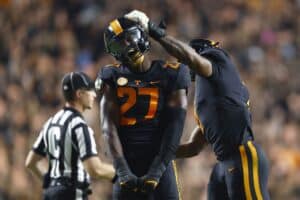
Stakeholders with conflicting interests, legislative chambers with divergent views, and a state senator who was arrested for burglary are all reasons why this year’s attempt at bringing sports betting to Minnesota is likely doomed.
Slim Chance in Senate
The House Ways and Means Committee has gotten House File 2000, Minnesota’s sports betting bill, back again for consideration. There is a very good chance the bill will pass the House but its chances of getting Senate approval appears to be slim to none.
HF 2000 sponsor Rep. Zack Stephenson had expressed optimism about the chances for his sports betting bill to pass. When asked about its chances earlier this month Stephenson said, “Well, I think momentum is building, I think we have a great chance. It’s a difficult bill because gambling bills by their nature have to be bipartisan, there are Democrats and Republicans who will never vote for it. So, you have to assemble a broad bipartisan coalition and these days that is very difficult, but momentum is building.”
Clashing Stances
But several schisms make passage of a sports betting bill, at least before this session adjourns on May 20th, highly unlikely. The major stakeholders are the state’s Native American tribes and they demand sports betting exclusivity, while Minnesota’s two horse tracks want a piece of the pie as well. The two groups have not worked well together and are unlikely to do so now.
Politically, the Native American tribes have the support of the Democrats while Republicans have backed the horse tracks’ contention that they need the additional revenue that sports betting licenses would bring to survive. The Senate is unlikely to vote for Stephenson’s bill as it gives the tribal nations everything they seek and the horse tracks nothing.
And if it wasn’t divided enough, several Gop Senators are trying to get Democratic Sen. Nicole Mitchell, of Woodbury, voting privileges suspended after she was arrested for breaking into her stepmother’s house and attempting to take some of her deceased father’s belongings.
No Compromise
Representative Stephenson also filed legislation, HF 5274, banning historical horse racing machines (HHR) which are, for all intents and purposes, slot machines. The Minnesota Racing Commission recently voted to allow 500 HHR machines at each of Minnesota’s two horse tracks, Running Aces and Canterbury Park.
This drew the ire of the Minnesota Indian Gaming Association (MIGA) because they contend these HHR machines will cannibalize business from their casinos that offer genuine slot machines. Most people cannot tell them apart which is why the Native American tribes are adamant about banning them.
“The Minnesota Racing Commission…voted to authorize historic racing machines (HHR) at the state’s two racetracks. This action was an extreme violation of legislative authority,” MIGA’S executive director Andy Platto said in a statement. “The commission rejected the opinion of the state’s gaming regulators at the Alcohol and Gambling Enforcement Division who have consistently held that these games are gambling devices just like slot machines, and thus are illegal under state law.”
Stephenson’s Bill
Representative Stephenson not only supported MIGA in its assertion but filed a bill, HF 5274, banning HHRs in Minnesota, which would eliminate the tracks from getting those machines. “I just want to be very clear with folks, there is no universe in which any bill that leaves this committee is going to authorize historical horse racing at the tracks,” Stephenson said. “That’s a total nonstarter, will not happen, will not be part of a sports betting deal. Bright red line in the sand.”
Running Aces subsequently filed a lawsuit in the US District Court for the District of Minnesota against the Mille Lacs Band of Ojibwe, operators of the Grand Casino Hinkley and Grand Casino Miles Lacs, as well as the Prairie Island Indian Community, operators of the Treasure Island Resort & Casino, for violating the federal Racketeer Influenced and Corrupt Organizations Act, known as the RICO Act.
The accusation is that the tribal casinos were offering card games like Ultimate Texas Hold’em and Three Card poker that are not allowed under their respective compacts with the state.
Running Aces CEO Taro Ito said in a written statement, “All that we have ever sought was to be treated fairly, compete on a level playing field, take advantage of improvements within the pari-mutuel environment, and operate without fear of being eliminated. It is our sincere desire to have our day in court and let the facts determine the outcome.”







